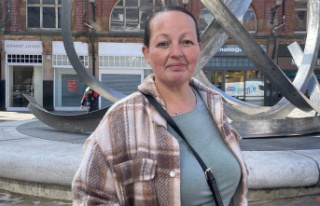Small businesses have been called "slap in their faces" by a government campaign asking them to lower prices to reduce living expenses.
According to the Federation of Small Businesses, asking struggling businesses to "take on additional costs is not realistic".
It is one of many groups that have criticised the taxpayer-funded ad campaign, which sees firms slashing prices starting in July.
Soon, the government will release a new official name and branding.
David Buttress, government's new Cost of Living tsar has suggested the ad campaign. However, a source within government told BBC that the government will not give any funding or subsidies to businesses in order for them to reduce prices.
Martin McTague is the national chair of FSB. He stated that most small businesses were "well beyond being able to absorb additional costs without passing them along, which is often a last resort".
He said that it was a disgrace for the government to spend extra tax from businesses on state marketing campaigns. These campaigns were doubtless targeted at large businesses offering corporate deals that could be rebranded as helping with the cost of living crisis and thus boost sales.
"Asking the group to cover additional costs is unrealistic, especially since so many are concerned about basic survival and have already reduced all expenses to the bone."
McTague claimed that there was more that the government could do, such as lowering VAT rates to get more small businesses out of business rates.
The government responded by saying that Mr Buttress's unpaid appointment was "the latest step in government's efforts to assist people with rising living costs".
A spokesperson stated that he will work with the private sector to develop, promote and identify new business-led initiatives to support people. This includes encouraging businesses to do more for discounted prices and product offers.
Prices are increasing at an unprecedented rate, reaching their highest point in 40 years. The rate of inflation in the UK, which is the rate at prices rise, stands at 9.1%. This is the highest level since March 1982. Due to record-high fuel costs, it is forcing people to reduce food shopping and car travels to save money.
Tim Martin, Wetherspoons' boss, stated that the campaign proposal was a classic example of tinkering by ministers who don't really understand money.
He said, "The major economic criticism of this government is its lack of an overarching plan. It just reacts to the events like a doctor who treats symptoms and not the cause."
Martin, a strong supporter of Brexit, stated that eliminating tariffs on non EU imports (such as bananas and rice, coffee, and children's clothing and shoes) would "immediately lower shop prices and inflation".
British Independent Retailers Association (Bira), stated that asking small retailers for lower prices was a "flawed concept".
Andrew Goodacre, chief executive of Bira, stated that supply chain inflation has been higher than consumer inflation for some time and independent retailers have had to operate on a smaller margin by suppressing retail prices.
He said, "We believe government intervention is necessary to reduce prices and stimulate the demand. The best way to do this is to lower VAT."
Kate Nicholls (chief executive of UK Hospitality), said that while bars, restaurants, and hotels are "already highly priced competitive", it also faces "colossal input cost that make price reductions extremely challenging".
She stated that energy costs have risen 74%, while goods and labour have risen 55%, 55%, and 54% respectively. While government efforts are welcome to assist consumers, it is clear that only one third of hospitality businesses are profitable at the moment.
The government created the 2020 "Eat Out To Help Out” scheme to help support hospitality businesses. Diners were able to get a 50% discount on food and soft drinks for a short period of time.
During this time, the government provided funding for the hotels to help with the discount.
Duncan Brewer, a partner with EY-Parthenon’s consumer products and retail teams, stated that price is "the single most important element in customers choosing where to shop". He added that retailers are "working extremely hard to offer their customers the best prices."
He said that they would be aware of the real danger in raising prices to keep their businesses afloat.
Helen Dickinson, the British Retail Consortium's chief executive, stated that many retailers are expanding their value ranges in order to keep "essentials" at a low price and offering discounts for vulnerable customers.
CBI hosted Mr Buttress' speech and said that it was vital that the government "continues to focus on building confidence in business" to help firms decrease the negative effects on consumers.
A spokesperson for the government said that businesses will continue to collaborate with the government in order to reduce the effects of rising costs.












